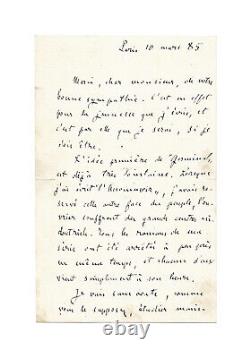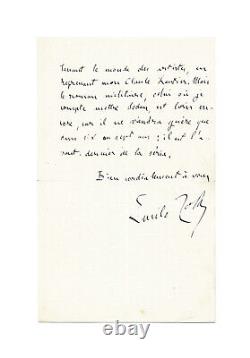
- Homepage
- Author
- Alfred Bruneau (3)
- Anatole France (3)
- Auguste Maquet (3)
- Beydts (louis) (4)
- Camille Mauclair (3)
- Charles Monselet (3)
- Chateaubriand (5)
- Ernest Daudet (3)
- Henri Barbusse (3)
- Jean Couty (3)
- Jean-léon Gérôme (5)
- Louise Read (4)
- Marcel Proust (5)
- Paul Chabas (4)
- Paul Meurice (3)
- Proust (3)
- Roger Martin Du Gard (4)
- Salomon Reinach (3)
- Sully Prudhomme (7)
- Violette Leduc (4)
- Other (3993)
- Binding
- Condition
- Era
- 18th Century (11)
- 1900 To 1960 (60)
- 1930s (4)
- 1960s (5)
- 1970s (7)
- 19th (5)
- 19th Century (48)
- 20th Century (15)
- Beautiful Era (12)
- Belle Epoque (49)
- First Empire (8)
- Nineteenth (19)
- Nineteenth Century (11)
- Post-war (21)
- Restoration (17)
- Revolution (4)
- Roaring Twenties (28)
- Second Empire (21)
- Second World War (5)
- World War Ii (9)
- Other (3709)
- Language
- Theme
Emile ZOLA / Autographed signed letter / Germinal / The Drinking Den / The Masterpiece / 1885




Handwritten letter signed "Emile Zola" to Joseph Canqueteau Paris, March 10, 1885, 2 p. In-8° Small slits at the folds, light stains.
Very beautiful letter, written a week after the release of Germinal in volume and giving an overview of some of the most emblematic works of the Rougon-Macquart series. "Thank you, dear sir, for your kind sympathy. Indeed, it is for the youth that I write, and it is through them that I will be, if I am to be.
The initial idea for "Germinal" is already very distant. When I wrote "L'Assommoir", I had reserved this other aspect of the people, the suffering worker of the large industrial centers. All the novels in my series were almost stopped at the same time, and each of them simply comes at its time. I am undoubtedly going to, as you assume, now study the world of artists, by taking up my Claude Lantier [L'Ouvre]. But the military novel, the one in which I plan to include Sedan [La Débâcle], is still far away, as it will not come for another six or seven years: it is the second to last in the series. Very cordially yours Emile Zola". It is known that even before writing the first of the twenty novels in his series, Zola had drawn up, as early as 1868, a genealogical tree of his characters, then a chronology of his novels. Initially planned in ten volumes, the writer revises his ambitions upwards. There will be a total of twenty novels written between 1870 and 1893. This letter thus allows us to grasp the almost millimetered organization that the writer imposes on himself, up to predicting with enough precision, "in six or seven years", the release of La Débâcle. Indeed, the second to last volume of the series is published during the year 1892.Bohemian artist already present in Le Ventre de Paris but whose role is only minor, Claude Lantier (older brother of Etienne, the hero of Germinal) becomes the main protagonist in L'Ouvre. A cursed painter, whose features resemble those of Paul Cézanne, his destiny is tragic, like that of his mother Gervaise Macquart in L'Assommoir.
This fourteenth novel of the series is published by Charpentier the following year, in 1886. We know the letter that Joseph Canqueteau, about to give a lecture on Les Rougon-Macquart, sends to Zola to ask for some information (while being right): "We are here a group of young people, who love you, I assure you, and know how to defend you when needed. You have youth on your side, dear master, that is a strong asset.
We greatly appreciate the honor you have done us by accepting the title of honorary member of our young conference. What a powerful book Germinal is!] I would be grateful, dear master, if you could tell me exactly when you had the idea for this vast social study? Will military life and artistic life be the subjects of two upcoming works?

